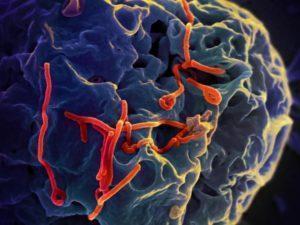
SEM image depicts a number of filamentous Ebola virus particles (red) that had budded from the surface of a VERO cell (blue-gray) of the African green monkey kidney epithelial cell line. (NAID, CDC Public Health Image Library)
Ebola virus diseases is caused by Ebolavirus spp, of which the Ebolavirus Zaire (EBOV-Zaire) is the most virulent and responsible for numerous Ebola outbreaks, including the 2014-16 West African outbreak which claimed 11310 lives. Antibody responses to other Ebolavirus spp have been observed up to 11 years post infection and/or exposure. Rimoin et al. detected antibody responses from living survivors of the first Ebola outbreak that occurred in the Democratic Republic of Congo (DRC) in 1976. Illustrating that functional antibody responses can be detected up to 40 years post EBOV-Zaire exposure.
Antibody responses play an integral role in immunity against Ebolavirus infection and disease. The most advanced experimental vaccine against Ebola ,VSV-ZEBOV, has been reported to have high (>95%) efficacy and induce robust protective antibody responses. This experimental vaccine was recently licenced for use during DRC Ebola outbreak in May 2017. However, duration and functional characterisation of long term (>11 years) antibody responses to natural Ebolavirus exposure remains limited.
The 1976 Ebola outbreak in DRC resulted in 318 cases, 280 deaths and 38 serologically confirmed survivors. Prior to Rimoin et al.’s publication, no characterisation of retrospective immunological responses of the 1976 outbreak survivors have been reported. Rimoin et al. measured functional antibody responses from 14 living survivors of the 1976 outbreak, of which 6 were confirmed cases and 8 were probable cases. All 14 survivors had detectable mild to strong IgG antibody responses against EBOV-Zaire glycoprotein, nuclear protein and/or viral matrix protein 40. Additionally, Rimoin et al. demonstrated that 29% of detected antibody responses were capable of neutralising pseudovirus, virus-like particles and/or live EBOV.
In summary, this research represents the first study of long term antibody mediated immunity from survivors of the first Ebola outbreak. Rimoin et al. provided the first evidence of long-lived antibody responses against natural EBOV-Zaire exposure, of which a small proportion are capable of neutralising virus.
Journal Article: Rimoin et al. 2017. Ebola Virus Neutralizing Antibodies Detectable in Survivors of the Yambuku, Zaire Outbreak 40 Years after Infection. The Journal of Infectious Diseases.
Article by Cheleka AM Mpande











